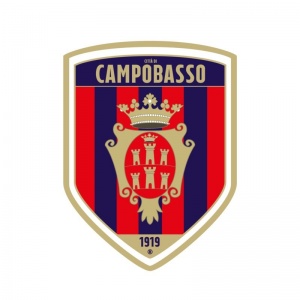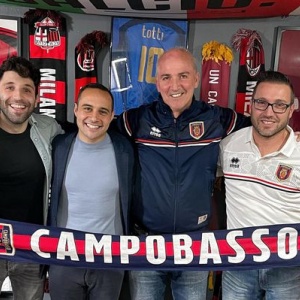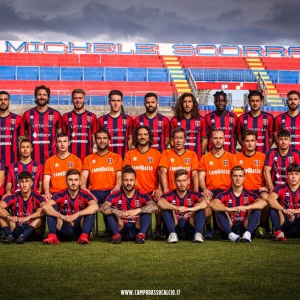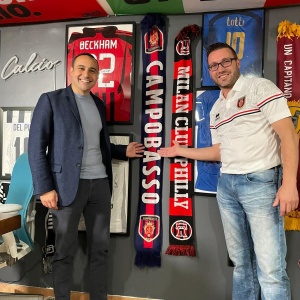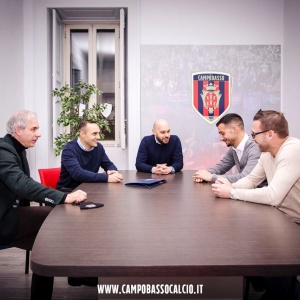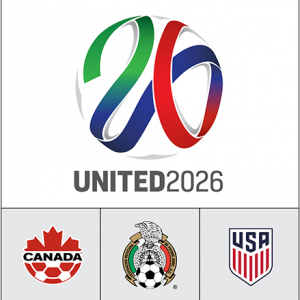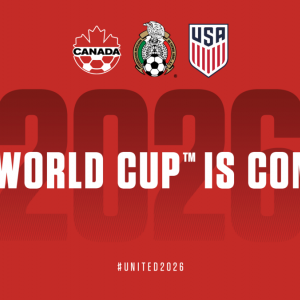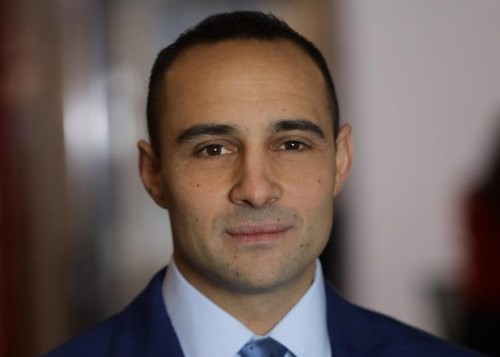
Matt Rizzetta (President of North Sixth Group)
La storia degli underdogs di Campobasso e un italoamericano visionario che investe nel calcio italiano: Matt Rizzetta

Every now and then we read the news that some Italian soccer team is being bought by an American. Sometimes they are not Italian Americans, as in the Serie A alone, the owners of AC Milan or Spezia or Parma or Roma, whose previous owner was indeed an Italian American. As Italian American is Rocco Commisso, the owner of Fiorentina. In Serie B, where Parma will play next year, the owner of Venezia is American. In Serie C there is Catania that seemed could be purchased by the former owner of the soccer teams of Bologna and Venice, the Italian American Joe Tacopina; Pisa, owned by a Russian who emigrated to America at the age of 16, where he made his fortune and took American citizenship; and Palermo, which until last year also had in its ownership the Italian American Tony Di Piazza.
If we consider professional soccer teams throughout Europe, there are 36 American owners. In Italy, out of 16 companies in the first three professional soccer leagues (A, B and C) of foreign ownership, 11 are American-owned. But in June there will be another one, because in those days another team owned by an American, or rather an Italian American, will rise from Serie D to Serie C: Matt Rizzetta's Campobasso. This is a story a little different from the others, more Italian American, and we are very pleased to tell it by welcoming its protagonist, Matt Rizzetta.
Hi Matt, please tell our readers what's your Italian American story
I grew up very connected to my Italian American roots. My grandparents immigrated to New York in the 1950’s from a little town called Monteleone di Puglia. My grandmother had spent her childhood back and forth between Italy and the United States and helped raise my mother while my grandfather remained in Italy to complete his military service before he joined her in the United States. My paternal grandparents were Sicilian and Calabrese, although they were raised in New York. We were always very proud of our heritage, and the Italian American experience was a central part of my childhood. Lots of family, food and love. That was thematic in my household growing up.
Your company is called North Sixth Group. Is it true that it's named after the street where your grandparents went to live when they came to America?
Yes, my grandparents were a big influence in my life and in my business career. They immigrated to Mount Vernon, NY, just north of the Bronx, and eventually settled on North Sixth Avenue. They inspired me in many ways growing up, and like many immigrants, entrepreneurship represented the culmination of the American Dream to them. When I founded my first company, I named it North 6th Agency (N6A) as a dedication to them and a way of showing them that all the sacrifices they made as immigrants were worth it. Today, we own multiple companies under the North Sixth Group portfolio across various sectors, all with a common vision of Passion, Purpose and Progress.
You are a young company, and it struck me that your CEO, who is also on the board of Campobasso soccer team, is a bright young woman, Daniela Mancinelli...
This is true. North Sixth Group was founded in 2020, although our first business unit in the portfolio, N6A, was founded over 11 years ago. When we added SS Campobasso to the North Sixth Group family of companies last year, it was important that we had a strong female presence to guide the club on important leadership decisions. Daniela is someone with whom I have had the privilege of working for many years and I could not think of a better ambassador for the club than her. She was unanimously voted on the board and she has been a great asset to the club, providing a global perspective as a successful female business leader. Females remain grossly underrepresented on boards of European football clubs, and we are hoping that Daniela’s appointment sets the right precedent for more clubs to follow in the years ahead.
Tell me about Campobasso soccer team...how did you come to this new adventure?
The mission of North Sixth Group is to invest in, and operate, businesses with a focus on Passion, Purpose and Progress. SS Campobasso represents each of these values. It was always a dream of mine to own a professional football club near the area where my grandparents came from and bring the region into the global spotlight. Campobasso is more than a football club for us. During a time of so much pain and suffering in the world, we view the club as a way of bringing people together and sharing a common message of hope and unity. Of course, football is the product and we are fiercely competitive on the pitch. However, the larger vision for the club is more than just football. The vision of the club is to serve as a platform for immigrants, expats and underdogs from all backgrounds to unite with a shared purpose.
One thing that's really interesting is Underdogs, the television series about Campobasso soccer that will air starting May 26 on Italian Football TV (IFTV). Personally I think it's a great idea: please tell us more.
The SS Campobasso investment has been so rewarding and exhilarating from day one. We wanted to document the experience and give fans across the world an opportunity to experience what it’s like to build a provincial professional football club into a global brand. There have been many documentaries about already established global clubs such as Manchester City, Tottenham and Juventus, yet there have been very few that have documented a small club that was aspiring to dream big. This was the impetus behind ‘Underdogs’. It will be a six-part series debuting on IFTV May 26th that takes the viewer on an all-access ride behind our journey with SS Campobasso. Everything from ownership meetings to training sessions to important personnel decisions will be documented for the viewer to experience. We have been fortunate to receive support from world-class partners to bring ‘Underdogs’ to life. The Colavita family, who is originally from Campobasso, has been incredibly generous in their support of the series as our banner sponsor.
Italian soccer now has several Americans, some with Italian ancestry like you, among those who own a team. Seen from America, what can and what must Italy and its soccer do to grow sportingly and economically?
I believe Italian football is one of the few remaining untapped gems in the professional sports asset class. Enterprise values of Italian football clubs are soaring, however the assets are still relatively undervalued with high upside potential compared to professional sports franchises in other leagues and countries. I believe the average enterprise value of a top-flight Italian football club is around $200 million, while average English Premier League clubs are several times higher. Despite this, the quality of play, the tradition, and the international consumer base that comes with Italian football make it an extremely appealing investment opportunity, in many ways more so than even the English clubs. However, just like any other business venture, it all comes down to the operating strategy and the ability to execute. Content, innovation and modernizing the clubs to appeal to a growing millennial expat audience are fundamental. However, it must be done in a way that maintains the rich traditions that make each club so unique. This is where many foreign investors make mistakes. The operating strategy needs to be a balance of innovation and maintaining the heritage that makes these clubs special. Of course, you have to win on the pitch as well. That is the most critical component of any operating strategy. Winning creates additional revenue streams that will enable you to constantly reinvest in improving the reach, visibility and differentiation of your club.
The United States will host, along with Mexico and Canada, the 2026 Soccer World Cup, the sport that is by far the most popular for the Italians. We have to come up with an idea to promote Italy in America when the matches will be played in American stadiums...
There are just under 20 million Americans and Canadians of Italian ancestry, so the fact that the 2026 World Cup is being played on American soil creates a unique opportunity to raise visibility and interest in Italian football on our continent. Football is an incredible source of pride and is indelibly linked to the Italian American experience just as much as cuisine, art and other contributions that Italians have made to our culture. I remember the 1994 World Cup vividly. It was a great feeling to be an American with Italian heritage as the Azzurri made it to the finals. 2026 will be another unique opportunity to showcase the beauty of Italian football to the American audience. The big difference this time around is that there are so many American investors with interests in Italian football. In 1994, I do not recall any American investors who owned Italian football clubs. My hope is that this creates added motivation to promote Italian football with the resources required to show the American audience why they should fall in love with the Italian game.
You may be interested
-
2015 Bocce Bash!!
Please join Mia Maria Order Sons of Italy in America Lodge #2813 as we host the 2015...
-
An Unlikely Union: The love-hate story of Ne...
Award-winning author and Brooklynite Paul Moses is back with a historic yet dazzling sto...
-
Cathedral of St. John the Divine, Oratorio S...
For the first time ever, The Cathedral of St. John the Divine, in collaboration with the O...
-
Davide Gambino è il miglior "Young Italian F...
Si intitola Pietra Pesante, ed è il miglior giovane documentario italiano, a detta della N...
-
Garibaldi-Meucci Museum to Celebrate Ezio Pi...
On Sunday, November 17 at 2 p.m., Nick Dowen will present an hour-long program on the life...
-
In sordina, l’Italia ritorna in scena al Nat...
La presenza italiana a Natpe 2016, la principale fiera Tv per il mercato Latino Americano...
-
Italian Master Drawings From The Morgan (Onl...
The Morgan Library & Museum's collection of Italian old master drawings is one of the...
-
Italian Open's History and Records: A tale o...
For Italians, and Romans in particular, the Open is not just a tennis tournament where cha...









